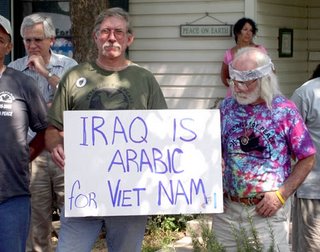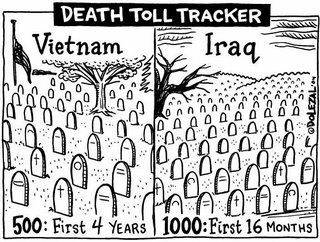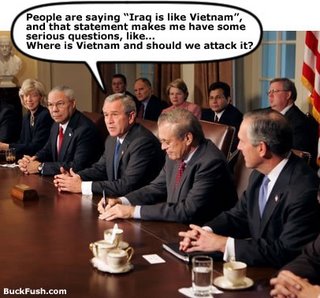Vietnam = Iraq
 Consortiumnews.com has an interesting article about the parallels between Vietnam and Iraq. It's called "Bush's Top Ten 'Vietnam' Mistakes."
Consortiumnews.com has an interesting article about the parallels between Vietnam and Iraq. It's called "Bush's Top Ten 'Vietnam' Mistakes."Perhaps if he'd served when his country called (instead of going AWOL in Alabama), he'd have learned the lessons of Vietnam the first time around. Or perhaps, if Laura had brought her literacy campaign home, he might have read about it. But no. Georgie wanted a war, a bigger better war than Daddy's, and he got one. Unfortunately, so did we all.
 Read the entire article––it's good. Here is the gist of it:
Read the entire article––it's good. Here is the gist of it: Because the Bush administration, almost from the start, has eschewed any comparison of Iraq with Vietnam, officials apparently never read the history of the nation’s heretofore worst war and have made the same 10 major mistakes:
1. Underestimating the enemy. As in Vietnam, the superpower’s potent military has been astounded by the tenacity and competence of a nationalist rebellion attempting to throw a foreign occupier from its soil.
2. Deceiving the American public about how badly the war is going. President Bush continues to talk of victory, and his chief military officer, Gen. Peter Pace, argued that the United States was making “very, very good progress” just two days before the more credible U.S. ambassador to Iraq warned that a civil war was possible in Iraq.
3. The Bush administration, like the Johnson and Nixon administrations, blames the media’s negative coverage for plunging popular support of the war.Yet the nature of the press is that it would rather cover extraordinary negative events, such as fires and plane crashes, than more mundane positive developments.
4. Artificial government statistics cannot be used to measure progress in a counterinsurgency war. In Vietnam, the body counts of North Vietnamese/Viet Cong were always much greater than U.S./South Vietnamese deaths. Lately, the Bush administration has touted that fewer U.S. personnel are dying in Iraq.
5. The initial excessive use of force in counterinsurgency warfare instead of a plan to win hearts and minds. The U.S. military, since the days of U.S. Grant, has used superior firepower to win wars of attrition against its enemies.
6. Failed “search and destroy” tactics belatedly gave way to the “inkblot” approach of clearing and holding ground. In both Vietnam and Iraq, after search and destroy missions, enemy fighters merely returned to areas when “victorious” U.S. forces left. But not enough U.S. forces are in Iraq to make the “clear and hold” method work.
7. “Iraqization” of the war parallels the unsuccessful “Vietnamization” in the 1970s. The Nixon administration never fully explained how the less capable South Vietnamese military could defeat the insurgency when the powerful U.S. military had failed. The same problem exists in Iraq.
8. As in Vietnam, there has been no “date certain” for withdrawal of U.S. forces. President Bush recently implied that U.S. forces would be in Iraq when the next president takes office. Such an indefinite commitment of U.S. forces convinces more Iraqis that the United States is an occupier that needs to be resisted.
9. Retention of incompetent policymakers. Lyndon Johnson retained Robert McNamara, the inept architect of the Vietnam strategy, as Secretary of Defense until McNamara himself turned against his own war. Bush has kept the bungling Donald Rumsfeld on too long in the same position.
10. Most important of all, starting a war with another country for concocted reasons, which did not hold up under scrutiny. Lyndon Johnson used a questionable alleged attack by Vietnamese patrol boats on a U.S. destroyer to escalate U.S. involvement in a backwater country that was hardly strategic to the United States. Bush exaggerated the dangers from Iraqi weapons programs and implied an invented link between Saddam Hussein and the 9/11 attacks. In a republic, the lack of a compelling rationale for sending men to die in a distant war can be corrosive for the morale of the troops and public support back home.



0 Comments:
Post a Comment
<< Home